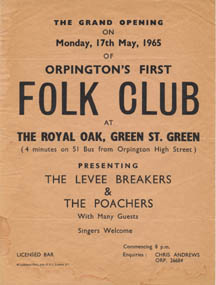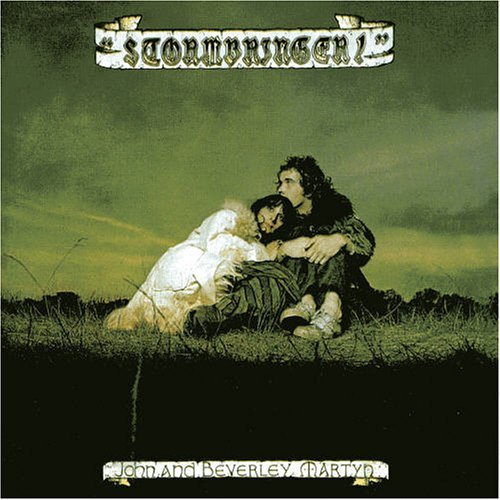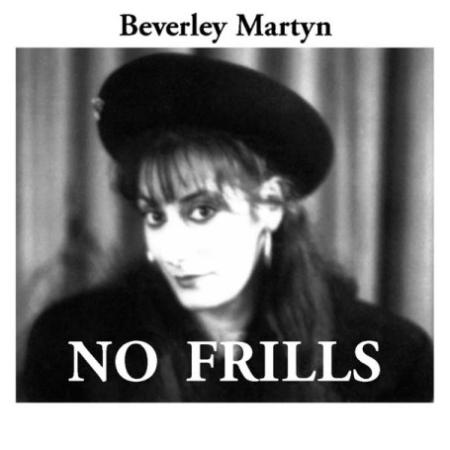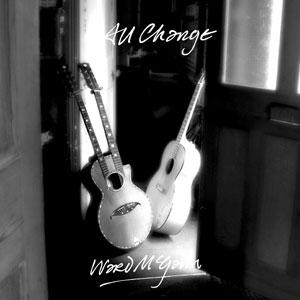RALPH, ALBERT & SYDNEY
TELLING TALES
Ralph McTell in conversation with John Beresford, January 2008.
Second on John's list of questions was a reference to Ralph's having joined a band in the mid-'60s...
|
The Levee Breakers
|
[John] Can I move on to another question?
[Ralph] Yeah, go ahead.
OK. Again, an eBay snippet. Not something I bought, but something I saw that had your name in the blurb. This was a single released in 1965 by the Levee Breakers…
Oh yeah.
|
… which is Beverley Kutner, before she became Beverley Martyn…
Correct.
…and Mac McGann…
Mac McGann I saw just two week ago.
Yeah? How is he?
He was married to Dorris Henderson for a while, a long while, and Dorris died, sadly, a couple of years ago. He’s picking up the pieces and carrying on. He still plays. He’s got his own band called East of Ealing. And Johnny Joyce was the third member, who passed away a couple of years ago.
Yes, so that was the original trio, wasn’t it?
Yeah, and I joined them for a while.
|

The Levee Breakers were Orpington Folk Club's
first guests in 1965. The line-up that night was:
Beverley Kutner (Vocals)
Johnny Joyce (12 String Guitar)
Mac McGann (Tiple & Harmonica)
Michael (Henry VIII) Bartlett (Jug)
|
|
That’s the story I’m looking for. Because I don’t think that’s recorded anywhere else. I don’t think it’s in the ‘Streets of London’ biography, and I don’t think you mention it anywhere in your own writings.
No, that’s true. It’s probably because… Mac decided to leave The Levee Breakers for reasons best known to himself. There was always a bit of tension, I felt, in the band, in the fact that Mac moves the music forwards, John holds it back.
Sometimes this is great - it stops the music speeding up too much. But sometimes it’s like driving with the handbrake on. And, you know, I’ve had trouble with various drummers in the past who don’t feel the beat where I do.
This is a strange thing, a little musical thing. There are three places for the beat - the down beat, the beat that you hear on the snare drum - the off beat and the down beat. They are on the beat, of course… but there’s the middle of the beat, there’s just before the beat, and there’s just after the beat. And various drummers play in one of those three places, and they’re all great drummers, but they can affect the momentum of a piece.
If it’s in the middle of the beat, it becomes like disco music and synthesized stuff. If it’s behind the beat, it can be kind of as if the drummer is really controlling the sound. And if it’s just after the beat, it can pick things up and energize more. I favour it just in front of the beat, just by a hair. It’s so hard to quantify. I can explain it by naming names, but if I did I would be naming the ones I don’t like, so I’m not going to talk about that.
When you play music, if you’ve got a guy that hears the beat where you do, or like… for me, Alun Davies is the finest rhythm guitar player to play with anyone – he worked with Cat Stevens for years – and we recorded ‘Bridge of Sighs’ with just the two of us. Everything was laid down with just two acoustic guitars, and everything else was added, including the drums, which went on last - which was just like Cat Stevens used to do with Gerry Conway.
The other guy that I love to play with is Wizz Jones, because Wizz hears the beat just in front of where it is. So he’s a real energized player, and he’s wonderful to play with - everything’s got an energy to it.
Well, that’s a bit like Mac, and I think that he felt he was driving with the handbrake on. So he left the band, and Johnny, who loved my finger-style blues playing said to me, “Would you come and join the band?”
|

Beverley and John Martyn in 1970

Beverley Martyn in 2001
|
Well, I think we only did about half a dozen gigs, and I did enjoy it. But, in those days, amplification and pick-ups in guitars were non-existent. Johnny played a 12-string, and Mac played an instrument called a ‘tiple’, which is a very full sounding… it’s tuned to a G banjo but in double strings, and he used to make it… it sounded like an orchestra. He’s playing on ‘Louise’ on my first album, and ‘Sleepytime Blues’, and he’s just a marvellous contributor.
I couldn’t fill in the gap. It wasn’t that I didn’t want to play, because Beverley at that time was very strikingly beautiful in the kind of Mediterranean-looking way. The boys all loved her. She was only about nineteen. She sang with such maturity and expression. She was absolutely fantastic, so it was a real buzz to do those few gigs with her; but I knew that I could never replace Mac, and strategically, at the right time, I left, and the band also kind of folded. But they were fantastic – if you’ve never heard them, there were an utterly, utterly fantastic trio.
The one single they put out…
‘Babe I’m Leaving You’
…I got hold of that via the internet…
|
|
Well, Mac wrote that, and I’m intrigued to think I even get a mention, but that’s nice.
You get a mention as the person who joined the band after Mac left – end of statement. So the questions were, you know, “How long did it last?”…
Not very long, months, I suppose, just a few months.
Did you take lead vocal with them?
No. I sang a little bit with them. I certainly sang a couple of things like, ‘I’m Wild About My Loving’. I would have sung that with them, because that was a chorusy type song, and there’s probably a couple of others. I’ll have to think about it, John, if you want to add actual titles to your list. We’ll have to try to get a song list from the Levee Breakers somewhere and just see…
|

This recent CD by Jeff Ward and Mac McGann
includes "Wild About My Loving"
|
|
That’ll be great, thank you. Clearly, you never got into the recording studio with them?
No. I recorded with John at home actually. I knew there were some tapes, but David opted for well-recorded pieces on the Box Set rather than stuff that I hoped might surface. Ninety per cent were studio recordings and I had hoped for more home… but I had to surrender the choice of material. There won’t be a place for those old home recordings - they were done on a fifteen-quid tape recorder.
But Johnny and I played together a lot. I think he saw me as a way of continuing his career. But it wasn’t really the direction I wanted to go in. We just remained mates right up until to the end.
Excellent. Good. I was going to mention David later, and the question of what else might be out there from the Box Set left-overs, if you like…
[Go to Next Tale: Chalkdust]
|
With thanks to Ralph for sharing his time and his memories.
The text of this interview is the copyright of Leola Music Ltd, and may not be reproduced without permission.
All illustrations are the copyright of their owners or publishers and are reproduced here for information only.
Thanks to Orpington Folk Club for their opening night poster.
|



